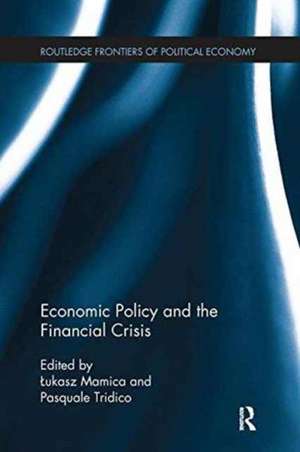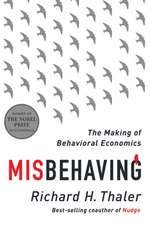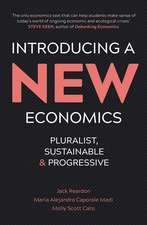Economic Policy and the Financial Crisis: Routledge Frontiers of Political Economy
Editat de Łukasz Mamica, Pasquale Tridicoen Limba Engleză Paperback – 4 ian 2017
This book offers an evolutionary-developmental analysis, combining elements of neo-Schumpeterian economics, institutional economics and post-Keynesian economics, to show that selection processes within an economy, and the institutional rules shaping those processes, are substantially more important than usually recognised by evolutionary economic theory. Two major challenges for economic theory and policy, in particular, have emerged during the crisis. The first is the rise of unemployment coupled with growing public deficits. The second is the financial instability which threatens the permanence of economic development. This book examines the performance of the advanced economies since the crisis and explores why some of them have been more successful in tackling these challenges than others. It is argued that the reasons for the varied performances of these economies lie in the economic policies which were introduced before and in the aftermath of the crisis and the differences in the regulation of their labour markets.
This volume will be of interest to students and academics in the areas of macroeconomics, public economics and public management.
| Toate formatele și edițiile | Preț | Express |
|---|---|---|
| Paperback (1) | 216.07 lei 6-8 săpt. | |
| Taylor & Francis – 4 ian 2017 | 216.07 lei 6-8 săpt. | |
| Hardback (1) | 546.84 lei 6-8 săpt. | |
| Taylor & Francis – 6 mar 2014 | 546.84 lei 6-8 săpt. |
Din seria Routledge Frontiers of Political Economy
-
 Preț: 309.90 lei
Preț: 309.90 lei -
 Preț: 309.79 lei
Preț: 309.79 lei -
 Preț: 316.03 lei
Preț: 316.03 lei -
 Preț: 310.95 lei
Preț: 310.95 lei - 9%
 Preț: 866.82 lei
Preț: 866.82 lei -
 Preț: 309.12 lei
Preț: 309.12 lei -
 Preț: 311.61 lei
Preț: 311.61 lei -
 Preț: 286.99 lei
Preț: 286.99 lei -
 Preț: 327.83 lei
Preț: 327.83 lei -
 Preț: 311.87 lei
Preț: 311.87 lei -
 Preț: 302.76 lei
Preț: 302.76 lei - 9%
 Preț: 938.48 lei
Preț: 938.48 lei -
 Preț: 152.67 lei
Preț: 152.67 lei -
 Preț: 151.97 lei
Preț: 151.97 lei -
 Preț: 318.54 lei
Preț: 318.54 lei -
 Preț: 317.95 lei
Preț: 317.95 lei -
 Preț: 310.01 lei
Preț: 310.01 lei -
 Preț: 326.49 lei
Preț: 326.49 lei -
 Preț: 155.44 lei
Preț: 155.44 lei -
 Preț: 309.79 lei
Preț: 309.79 lei -
 Preț: 328.76 lei
Preț: 328.76 lei -
 Preț: 281.72 lei
Preț: 281.72 lei -
 Preț: 286.58 lei
Preț: 286.58 lei -
 Preț: 386.12 lei
Preț: 386.12 lei -
 Preț: 353.78 lei
Preț: 353.78 lei -
 Preț: 325.09 lei
Preț: 325.09 lei -
 Preț: 310.55 lei
Preț: 310.55 lei -
 Preț: 371.95 lei
Preț: 371.95 lei -
 Preț: 324.87 lei
Preț: 324.87 lei -
 Preț: 312.86 lei
Preț: 312.86 lei -
 Preț: 374.16 lei
Preț: 374.16 lei -
 Preț: 329.09 lei
Preț: 329.09 lei -
 Preț: 348.22 lei
Preț: 348.22 lei - 28%
 Preț: 1047.06 lei
Preț: 1047.06 lei - 18%
 Preț: 1169.45 lei
Preț: 1169.45 lei - 18%
 Preț: 1555.17 lei
Preț: 1555.17 lei - 18%
 Preț: 1048.43 lei
Preț: 1048.43 lei - 18%
 Preț: 1059.84 lei
Preț: 1059.84 lei - 31%
 Preț: 767.47 lei
Preț: 767.47 lei - 18%
 Preț: 731.92 lei
Preț: 731.92 lei - 26%
 Preț: 822.54 lei
Preț: 822.54 lei - 18%
 Preț: 1796.21 lei
Preț: 1796.21 lei - 26%
 Preț: 1184.91 lei
Preț: 1184.91 lei - 18%
 Preț: 1120.23 lei
Preț: 1120.23 lei - 15%
 Preț: 700.95 lei
Preț: 700.95 lei - 18%
 Preț: 1116.31 lei
Preț: 1116.31 lei - 22%
 Preț: 299.52 lei
Preț: 299.52 lei
Preț: 216.07 lei
Preț vechi: 379.25 lei
-43% Nou
Puncte Express: 324
Preț estimativ în valută:
41.35€ • 44.21$ • 34.47£
41.35€ • 44.21$ • 34.47£
Carte tipărită la comandă
Livrare economică 17 aprilie-01 mai
Preluare comenzi: 021 569.72.76
Specificații
ISBN-13: 9780415787222
ISBN-10: 041578722X
Pagini: 320
Ilustrații: 98
Dimensiuni: 156 x 234 x 26 mm
Greutate: 0.45 kg
Ediția:1
Editura: Taylor & Francis
Colecția Routledge
Seria Routledge Frontiers of Political Economy
Locul publicării:Oxford, United Kingdom
ISBN-10: 041578722X
Pagini: 320
Ilustrații: 98
Dimensiuni: 156 x 234 x 26 mm
Greutate: 0.45 kg
Ediția:1
Editura: Taylor & Francis
Colecția Routledge
Seria Routledge Frontiers of Political Economy
Locul publicării:Oxford, United Kingdom
Public țintă
Postgraduate and UndergraduateCuprins
Introduction Lukasz Mamica and Pasquale Tridico Part I: Theory, Policies and Institutions: A macroeconomic approach 1. Bridges to Babylon: Critical Economic Policy From Keynesian Macroeconomics to Evolutionary Macroeconomic Simulation Models Hardy Hanappi 2. Why Did Some Countries Perform Better Than Others During The 2007-12 Crisis? Pasquale Tridico 3. Aiding Economic Recovery after the Financial Crisis Malcolm Sawyer 4. Could More Labour Market Flexibility Help Growth? Lessons from an amended Kaleckian model Amitava Krishna Dutt, Sébastien Charles and Dany Lang 5. Institutions and Youth Labour Markets in Europe during the Crisis Niall O’Higgins Part II: Financial Regulations for Better Economic Stability 6. Financial Regulations for Minimizing Economic and Social Crises: An evolutionary developmental analysis with unequally rational individuals Pavel Pelikan 7. ‘Liquidity’ in Light of the Shadow Banking System: Lessons from the two crises Anastasia Nesvetailova 8. Financial Instability and Functional Finance: A Lerner-Minsky perspective Faruk Ülgen 9. Fiscal Consolidation and Sovereign Debt Risk in Balance-Sheet Recessions: An agent-based approach Marco Raberto, Silvano Cincotti and Andrea Teglio Part III: Competitiveness and Sustainability in Times of Crisis 10. Leading Factors for Catching-Up by Developing Economies: Conclusions from the crisis Tomasz Geodecki 11. Added Value of Design as a Factor of Firm Competitiveness in Times of Crisis Łukasz Mamica 12. The Decent Work Basic-Relations-Fairness Approach in a Context of Crisis in Italy Martina Lavagnini and Antonella Mennella 13. The Co-operative Firm: A lively non-capitalist actor for troubled market economies Andrea Bernardi and Anna Greenwood 14. Active Employment Policy in the EU and in Poland: A Gordian Knot or Inertia Enchanted in Words? Leszek Cybulski and Ewa Pancer-Cybulska
Notă biografică
Łukasz Mamica is Senior Lecturer in Public Economy and Innovation Policy at the Krakow University of Economics, Poland.
Pasquale Tridico is Professor of Labour Economics and Jean Monnet Professor of European Integration Studies at the University Roma Tre, Italy. He is currently General Secretary of the European Association for Evolutionary Political Economy.
Pasquale Tridico is Professor of Labour Economics and Jean Monnet Professor of European Integration Studies at the University Roma Tre, Italy. He is currently General Secretary of the European Association for Evolutionary Political Economy.
Descriere
The key issue for current economic policy is to find a balance between the stabilisation of public finance and maintaining the momentum of long-term growth. This book argues that the reasons for the varied performances of the advanced economies lie in the economic policies which were introduced in the aftermath of the crisis and the differences in the regulation of their labour markets.














